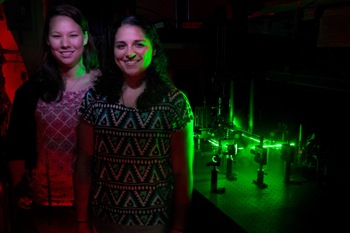Jun 21 2013
Collagen, Raman-tweezers and nanotechnology are all well-known words for three Appalachian State University undergraduate physics majors.
 Angela “Nikki” Chang, left, and Jessica Barrios stand in front of an optical tweezers apparatus that Chang is using to study nanoparticles used in cancer therapy. (Photo by Amanda Getty)
Angela “Nikki” Chang, left, and Jessica Barrios stand in front of an optical tweezers apparatus that Chang is using to study nanoparticles used in cancer therapy. (Photo by Amanda Getty)
Angela “Nikki” Chang of Matthews, Jessica Barrios-Hernandez of Miami Beach, Fla., and Jenna Osborn of Chapel Hill have each received a $5,000 Undergraduate Biotechnology Research Fellowship from the North Carolina Biotechnology Center to support research with faculty mentors in the Biophysics and Optical Sciences Facility in Appalachian’s Department of Physics and Astronomy.
The awards are designed to encourage interest in and preparation for careers in biotechnology.
Barrios-Hernandez and Osborn will work with Dr. Jennifer Burris and Dr. Brooke Hester, both assistant professors in the department, on projects to better understand collagen’s structure and function. Chang will work with Hester to study nanoparticles used in cancer therapy.
This is the third consecutive year that undergraduate physics majors at Appalachian have received these fellowships.
“Collagen is the most abundant protein in the human body. It’s the main structural component in the body. It’s in bone, skin, teeth and connective tissue,” Burris said. “Biologists understand what collagen does in the human body, but there is not yet a complete understanding of how collagen does what it does at a fundamental level.”
Hester said the research can potentially help the scientific community better understand the function of collagen’s basic building blocks. “If that was better understood, that knowledge could be used for a lot of applications, such as wound healing, creation of synthetic tissues and to help researchers understand cervical changes that occur during pregnancy,” she said.
Osborn will use chemical protocols and scanning electron microscopy to create and characterize collagen networks that Barrios-Hernandez will manipulate and study with Raman-tweezers, a laser device that allows researchers to study and identify structure and forces for microscopic objects.
Chang will use a heating laser and Raman spectroscopy to help determine the temperatures of a microscopic object to learn about nanoparticles used in cancer therapy. “The nanoparticles get hot and burst tumor cell membranes. We want to measure how hot they are using a technique Angela is working on,” Hester said.
The professors said research fellowships, such as the ones from the North Carolina Biotechnology Center, have many benefits. “These fellowships allow students to participate in research full time and be paid for it, which is really important for a good research experience,” Hester said. “You can’t accomplish as much when you are volunteering five to 10 hours a week, as compared to full-time work.”
Burris added, “It also trains them to be better graduate students and makes them more competitive going to graduate school because of this research experience. After their fellowship, the students will be able to train new students who come into the laboratory, gaining leadership experience.”
The fellowships also help move the professors’ research forward faster than if they did not have student assistance, Burris said.
Currently, 10 undergraduates and two graduate students are gaining research experience this summer under Burris’ and Hester’s tutelage. The research includes collaboration with biology, fermentation science, geology, chemistry computer science.